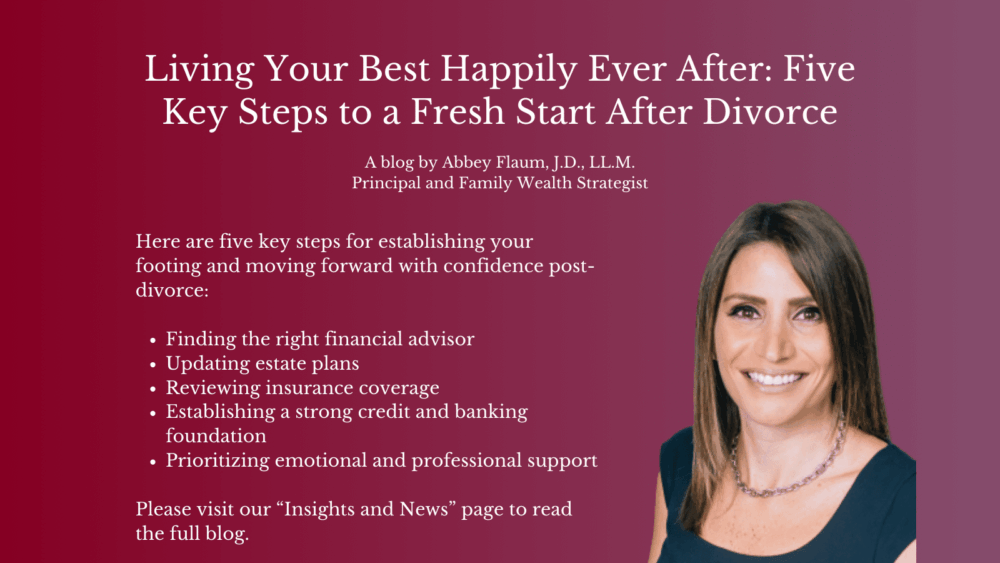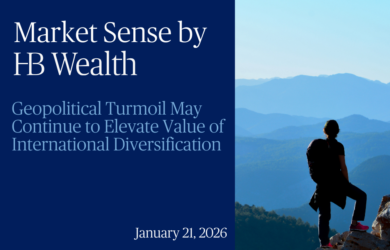Divorce marks the end of one chapter, and the beginning of another. Whether the decision was yours or not, the stretch of uncertainty is behind you, and the path ahead is yours to shape. This new chapter may bring changes big and small: a different hairstyle, a new home, new career goals, or even a new relationship; but, one thing is certain: your life is now different, and setting a strong foundation for that new life is essential.
The following are five key steps to help you establish your footing and move your new life forward with confidence and clarity.
Finding the Right Financial Advisor
Financial stability is one of the most important pillars of your fresh start. Divorce often brings a completely new financial landscape; one that can feel unfamiliar and overwhelming. This is where the right financial advisor can make all the difference.
Seek out an advisor who has experience guiding individuals through the post-divorce transition. They can help you:
- Create a realistic budget for your new household.
- Adjust to a single income and plan for taxes.
- Navigate alimony, child support, and investment accounts.
- Set goals for retirement, home purchases, and/or education funding.
- Revisit and appropriately revise your estate plan.
Importantly, not all advisors are created equal. Look for someone who is a true fiduciary—an advisor legally and ethically obligated to act in your best interest, with no hidden agendas. Transparent fees and a client-centered approach are essential. Ideally, your advisor will also have access to a team of specialists, offering both investment management and comprehensive financial planning services.
Updating Estate Plans
Even if your divorce decree is finalized, your estate plan might still reflect your married life. In many states (like Georgia), divorce automatically revokes a former spouse’s rights under your will or trust…but not always. Even when it does, other documents, like beneficiary designations, may still need your attention.
Work with an estate planning attorney to:
- Remove your former spouse as a beneficiary and in legal roles they were previously named to fulfill. If, despite the divorce, you still want your ex to benefit from your estate or administer your estate as executor or trustee, you may need to specifically describe this in your documents after the divorce to ensure that local law will permit this.
- Draft new wills and trusts that reflect your wishes and protect your privacy.
- Update powers of attorney and healthcare directives so that the right, trusted individuals may act to carry on your financial life for your benefit and make health care decisions for you in the event you are not able to make such decisions for yourself during your lifetime.
- Review and revise all beneficiary designations on retirement accounts, life insurance, and payable-on-death or transfer-on-death accounts. These designations may override your will and can lead to unintended consequences if not updated.
Reviewing Insurance Coverage
Your insurance needs may look very different now. Take time to reassess your coverage to make sure you’re protected in this new phase of life:
- Health Insurance: If you were covered under your ex’s plan, you may need to secure new coverage through COBRA, employer coverage, or a marketplace plan.
- Life Insurance: You may need to change beneficiaries or secure new coverage, particularly if alimony or child support are involved.
- Disability Insurance: Income protection becomes even more critical if you’re solely responsible for your household finances.
- Long Term Care Insurance: Planning for your future care needs ensures that you remain financially secure and self-sufficient.
Establishing a Strong Credit and Banking Foundation
Starting fresh often means taking steps to fully separate and establish your financial independence:
- Open new bank accounts in your name alone.
- Apply for your own credit cards and make consistent, on-time payments.
- Regularly monitor your credit reports to confirm that joint accounts have been closed and there are no lingering financial ties to your former spouse.
These steps can empower you to take control of your financial life and build (or rebuild) a strong credit profile.
Prioritizing Emotional and Professional Support
Divorce doesn’t just affect your finances; it touches every part of your life. As you move forward, make space for healing and personal growth.
- Consider working with a therapist or divorce coach to process your emotions and gain clarity.
- Join support groups that provide connection, community, and perspective.
- Explore professional coaching or career counseling if you are returning to the workforce or pursuing a new path.
Taking care of your emotional well-being is not only healing; it is essential to your long-term success.
Final Thoughts
You have weathered a major life transition. Now it’s time to build something beautiful for yourself on your own terms; to ensure that you are not just surviving, but you are thriving. With the right financial guidance, legal planning, insurance protection, and emotional support, you may create a life that feels both stable and full of promise. You do not have to do it all at once, and you definitely do not have to do it alone. Your “happily ever after” is still yours to write, and it starts with these first few steps.
If you have any questions or would like to discuss this further, please reach out to your client service team, call us at 404.264.1400, or visit us on the web at HomrichBerg.com.
Important Disclosures
This article may not be copied, reproduced, or distributed without Homrich Berg’s prior written consent.
All information is as of the date above unless otherwise disclosed. The information is provided for informational purposes only and should not be considered a recommendation to purchase or sell any financial instrument, product, or service sponsored by Homrich Berg or its affiliates or agents. The information does not represent legal, tax, accounting, or investment advice; recipients should consult their respective advisors regarding such matters. This material may not be suitable for all investors. Neither Homrich Berg, nor any affiliates, make any representation or warranty as to the accuracy or merit of this analysis for individual use. Information contained herein has been obtained from sources believed to be reliable but are not guaranteed. Investors are advised to consult with their investment professional about their specific financial needs and goals before making any investment decision.
©2025 Homrich Berg.














Key Economic and Investment Themes to Watch in 2026
As we look to 2026, this video shares our perspective on several key economic and…
Read More